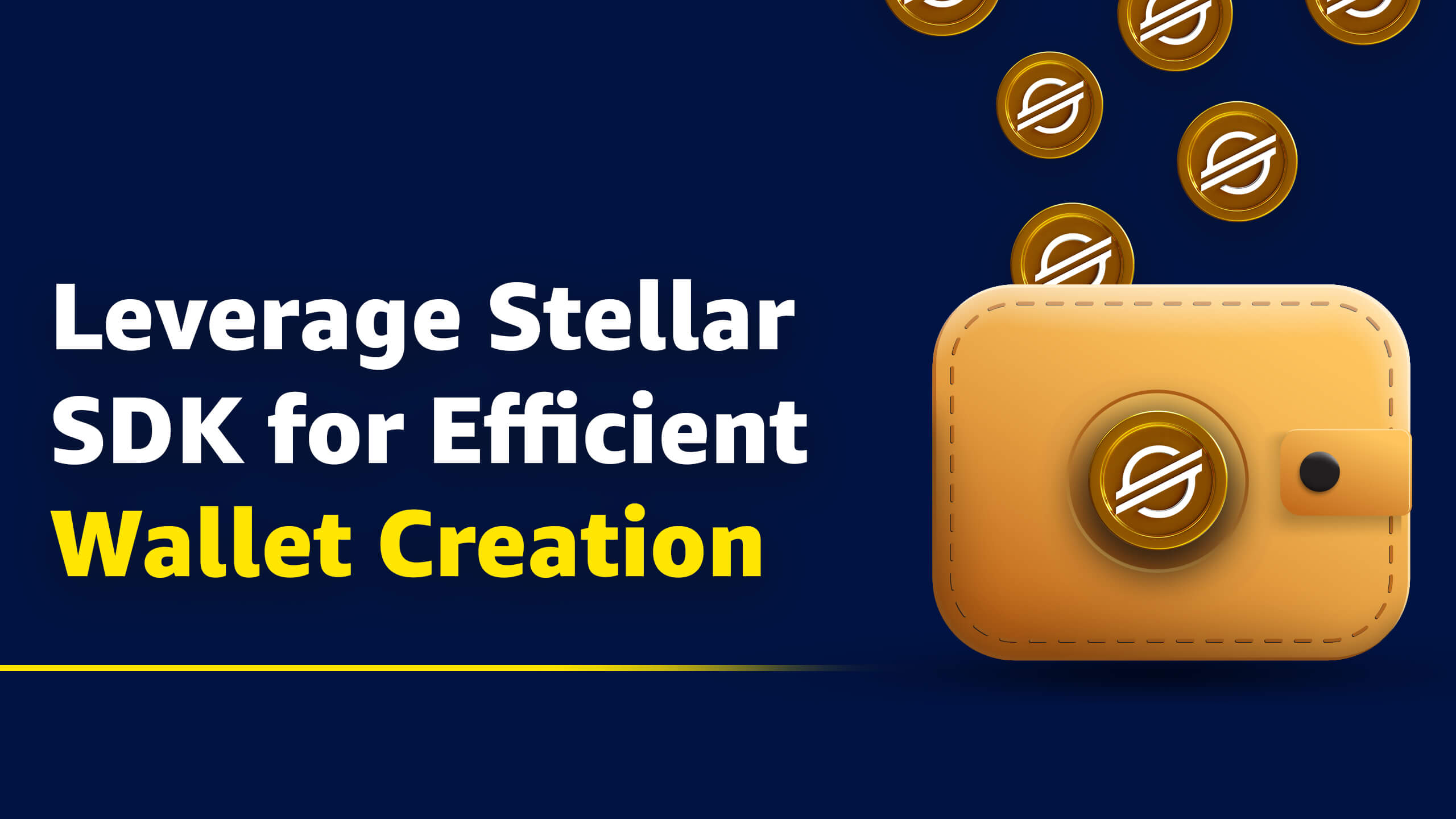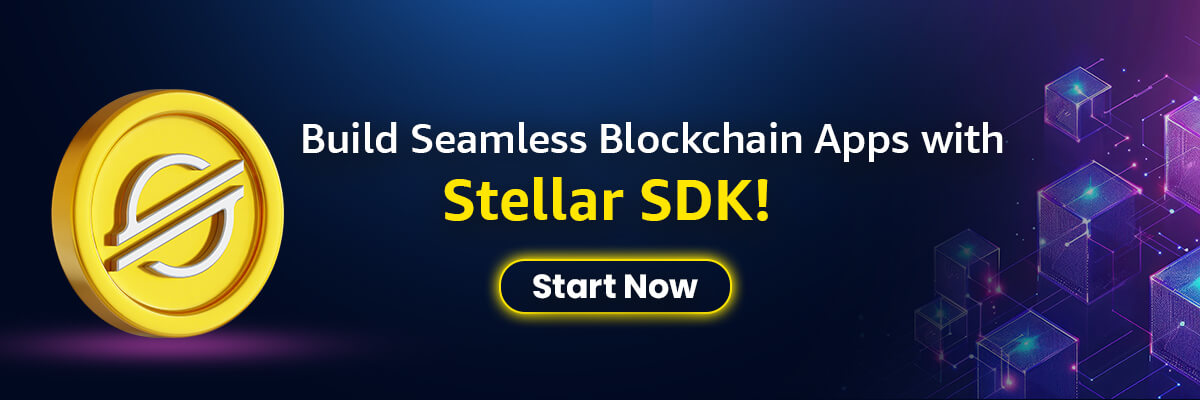Wallets play a huge role in facilitating transactions and payments of all sorts using digital tokens and cryptocurrencies. Every blockchain supports this specific dApp so that users can access their crypto holdings and proceed further with the payment transactions they intend to do. This also includes the Stellar global network, which supports advanced and high-level wallets through which users can easily make transactions using the native token, Lumens, or XLM. If you are planning to develop this high-end and state-of-the-art wallet, using the list of available Stellar SDK is the best option for an efficient software development life cycle.
While it might sound quite tempting, using the SDK library won’t be a piece of cake. Since Stellar blockchain is relevantly new in the decentralized ecosystem, professionals have yet to familiarize themselves with the underlying technologies, scope, usage, and other relevant facts. Owing to this, they fail to harness the true potential of the SDK libraries associated with the Stellar global network and develop efficient wallets. With this being said, we have curated a detailed guide, explaining the entire process of Stellar wallet creation using the SDKs and other relevant topics, including sample code pieces for better understanding.
Stellar Wallet: A Brief Introduction
Considered the best medium for initiating any crypto transaction, the Stellar wallet allows users to control and manage their token holdings on the Stellar global network. From initiating payments to transferring to another wallet, it can be used in numerous ways, thereby opening numerous transaction channels for the users. Every Stellar wallet comes with a well-secured private key that isn’t exposed to the external world, which is why it falls under the non-custodial wallet category. What’s more, it comes with numerous features that allow investors and asset owners to harness the true potential of the financially-inclusive Stellar blockchain.
Features To Develop For The Stellar Wallet
Developing a Stellar wallet will require appropriate feature planning and implementation. Only then it will be able to live up to the standards and become an exemplary decentralized application deployed on the Stellar blockchain network. Below, we have briefed a couple of wallet’s inherent features that can be easily developed using the Stellar SDK.
- The Stellar wallet must support a swapping mechanism, meaning it should allow users to change their crypto tokens to fiat currencies and vice versa by using stellar anchors that connect the Stellar blockchain with the traditional financial rails.
- Every wallet needs to be non-custodial, meaning the private key should be encrypted using top-level protocols, ensuring zero visibility of the information to the outer world.
- It must support transactions initiated with Stellar’s native currency or Lumens, which is how it allows the users to access the Stellar global network within a few clicks.
- Every Stellar wallet needs to have a multifaceted security layer, including biometric recognition, two-factor authentication, and many more so as to prevent unauthorized access to the fund holdings and other crucial information.
- Also, developers need to ensure the wallet follows the decentralized mechanism and should conduct transactions based on the private key information and not the user’s identity.
Stellar SDK Library: The Easiest Way To Connect With The Stellar Network
SDK stands for Software Development Kit and comes with a vast range of tools and components required to develop software in a preferred language. Even though Stellar is quite new compared to other blockchains in the decentralized ecosphere, it comes with numerous SDKs and documentation samples to help developers build the best-quality and state-of-the-art applications and smart contracts, including the wallets. These allow the developers to build Stellar wallets using their preferred language, like PHP, Rust, JavaScript, Python, Go, and even Java. Hence, they don’t need to learn any new language to master the project and bring the wallet’s ideation to life.
In this following discussion, we have explained the most popular Stellar SDK libraries that are often used to develop Stellar wallets.
1. Soroban Rust SDK
Since the wallets function based on smart contracts, which are nothing but automated scripts that execute based on the conditions pre-defined in the technological architecture, you can use this Soroban Rust SDK. It will help you build the wallet and deploy the software to the Stellar global network by using the Rust framework, a powerful programming language that’s lightweight and offers developers impeccable scalability.
2. AssemblyScript SDK
You can also use the as-soroban-sdk to develop and deploy the wallets to the Stellar global network by leveraging the AssemblyScript programming language. It is based on TypeScript language and utilizes the WebAssembly framework for code compilation. It also comes with numerous runtime options, like minimal, incremental, and stub to allow developers to execute the programs based on their preferred parameters.
3. JavaScript SDK
One of the most popular programming languages that is used to develop the Stellar wallet is JavaScript and since you have the SDK in Stellar’s code library, you don’t have to build a tech stack all by yourself. It will help you to establish a direct communication channel with the Soroban RPC server where all the smart contracts controlling the wallet’s performance and the transactions to be involved can be deployed. It will also facilitate interaction with the Stellar API and build immutable transactions on the Stellar global network.
4. Python SDK
If you want to use the Python library for developing the Stellar wallet, you can include the dependency named py-stellar-base in your project. It will help you to communicate with the Stellar Horizon server instantly, ensuring faster transactions and easy access to the private key pair. The SDK will provide a separate and independent network layer for integrating the Horizon API endpoints along with creating a Stellar Horizon instance during any transaction initiated on the global network.
5. iOS SDK
If you plan Stellar wallet development specific to the Mac and iOS platforms, the stellar-ios-mac-sdk is your best option. It comes with a full-scale library of different APIs that can be used to connect with the Horizon server instantly and facilitate the underlying microservice architecture of the wallets. Additionally, it can also be used to connect with the Soroban RPC server for building and deploying the smart contracts controlling the wallet operations and defining the transactions involving the concerned private key pairs.
Advantages of Using Stellar SDK For Wallet Development
Before you start using the SDK library for Stellar wallet development, it’s essential to understand the benefits of the same and then plan the development project. Below, we have explained a few advantages of using the Stellar SDK library rather than building a separate technology stack from scratch.
- Since SDKs come with pre-built components and a well-chosen tool collection, developers can straightaway commence the project without having to waste time building the stack by themselves.
- With so many different SDKs available in the Stellar network, developers can use their preferred language for wallet development and ensure the application gets deployed to the Stellar global network without any hassle.
- All the SDKs are open-source, meaning they come with numerous and detailed documentation to help developers overcome the complexities associated with the project.
- Stellar SDKs offer a direct connection with the Soroban RPC and Horizon API layers, ensuring seamless development and deployment of the smart contracts controlling the working of the wallets.
Conclusion
In this article, we have illustrated the ways in which Stellar SDK can ease the efforts and complexities of developing the Stellar wallet using different programming languages, like Python, JavaScript, Rust, and AssemblyScript. Based on these explanations, you can easily choose the SDK as per your preferences and start building the wallet application.





